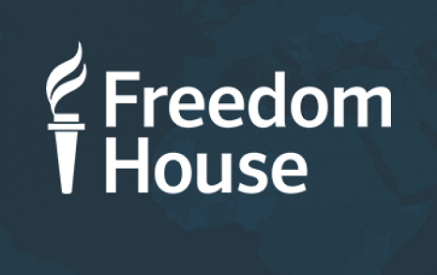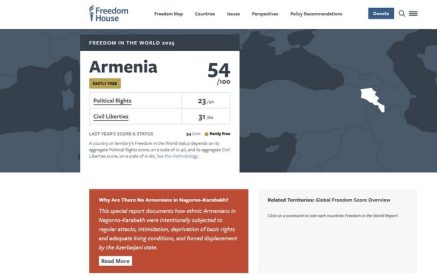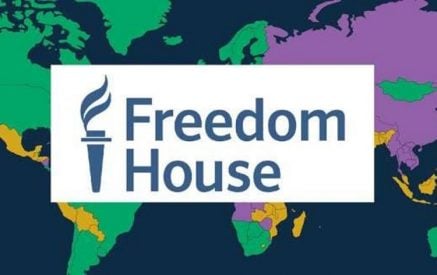A United States-based human rights watchdog has given Armenia a slightly lower Democracy Score this year, citing its government’s consolidation of power in 2023.
The score is an average of ratings across different areas that the organization tracks in its yearly report called Nations in Transit.
According to Freedom House, in 2023, Armenia’s Democracy Score went down from 3.11 to 3.07 (with 7 being the highest score possible). Specifically, the rating for National Democratic Governance decreased from 2.50 to 2.25.
This decline is attributed to “the executive’s consolidation of power, the multiyear trend of central authorities overreaching and impeaching opposition mayors, and the lack of transparency in ruling party finances.”
Read also
The report acknowledged that Armenia made major positive reforms in 2023 regarding the judiciary, the police, the fight against corruption, fiscal policy, the electoral code, education, and territorial administration, but added: “Though some reforms deliver effective regulations, they often fall short of their objectives due to poor or inconsistent implementation.”
In electoral terms Freedom House highlighted elections to the Yerevan City Council, considering them as an “important intermediary indicator for the ruling party ahead of the next nationwide legislative elections in 2026.”
It said that “the electoral process generally received a positive evaluation from local and international observers and that the process was free of the bribery and voter intimidation that had once been commonplace.”
At the same time, Freedom House noticed that “during the campaign period, local observers and independent media observed widespread misuse of administrative resources in favor of the ruling party.”
The report also noted a 28.5-percent turnout that was well below the 44-percent turnout in Yerevan’s previous elections in 2018. “The result is symptomatic of polarized domestic politics where the citizens are both disappointed in the post-revolutionary elites’ failures and refuse to back the alternative represented by the previous regime,” Freedom House said.
The watchdog also referred to rising concerns about “the returning political influence of big businesses” due to “a lack of transparency and accountability in the financing of the ruling party” which it said could be “a major setback from the goals and gains of the 2018 Velvet Revolution.”
As a positive development the Freedom House report mentioned that in November the Armenian government adopted a decision backing the decentralization of authority in Armenia, as well as an action plan of corresponding reforms aimed at improving democratic participation, capacity, and the quality of public services at the local level.
On the other hand, the report said that “against the backdrop of these critical reforms, local authorities’ guarantees of independence and legitimacy have come under question due to Civil Contract’s systematic attempts to force opposition mayors elected by their local constituencies out of office.”
In terms of judicial reforms, Freedom House noted that “a number of measures have been undertaken to ease judges’ overload and decrease their bureaucratic burdens, which have long presented obstacles for an effective judiciary.”
At the same time, it referred to “particular concerns over measures disciplining or otherwise going against judges questioning the Supreme Judicial Council’s independence, as well as judges associated with the former regime.”
“Meanwhile, loyal judges with a questionable record of impartiality and independence are favored,” the report said.
It also mentioned complaints of Armenia’s opposition politicians, activists and lawyers about “the continuing practice of pretrial detention as a means of punishment.”
“Even though Armenia has adopted alternative methods of restraint since 2021, such as house arrest and suspension from office, pretrial detention remains the most prevalent practice and is applied against a number of opposition figures,” Freedom House wrote, adding, “During 2023, public watchdogs have been alarmed about the increase in cases of violence against citizens by the police and other law enforcement agencies… Police brutality has been registered at protests, during regular patrols, and while off-duty.”
Freedom House noted that last year Armenia adopted its Anticorruption Strategy for 2023–26. At the same time, it referred to a report published by the Council of Europe’s Group of States against Corruption (GRECO) in 2023 assessing Armenia’s progress in implementing anticorruption recommendations issued since 2015 that concluded that nine out of 18 recommendations “have now been implemented satisfactorily or have been dealt with in a satisfactory manner; nine recommendations have been partly implemented.”
“Several journalistic investigations throughout the year have revealed new cases of questionable conduct by officials or persons connected to them,” Freedom House said, adding that “the practice of public tenders being awarded to companies affiliated with ruling party politicians continues.”
In terms of media independence, the report mentioned that 2023 saw “several regressive legislative initiatives by the government and ruling party legislators concerning access to information and freedom of expression.”
“Notably, at the government’s initiative, the National Assembly added a new restrictive clause to the Law on Freedom of Information allowing requests for official data to be declined if the requested material contains ‘official information of limited distribution’.”
The report stressed that “according to media watchdogs, the vague and general character of the clause gives the government too much room for interpretation, further limiting journalists’ access to official data.”
Freedom House also referred to events happening around Armenia, including Azerbaijan’s 10-month-long blockade of the Armenian-populated region of Nagorno-Karabakh and its subsequent “ethnic cleansing” in September. References were also made to Armenia’s deteriorating relations with Russia and warming relations with the West.
“Not only have these national security issues been Armenians’ most significant concerns, but they also have shaped the domestic political landscape,” the report said, in particular.

























































